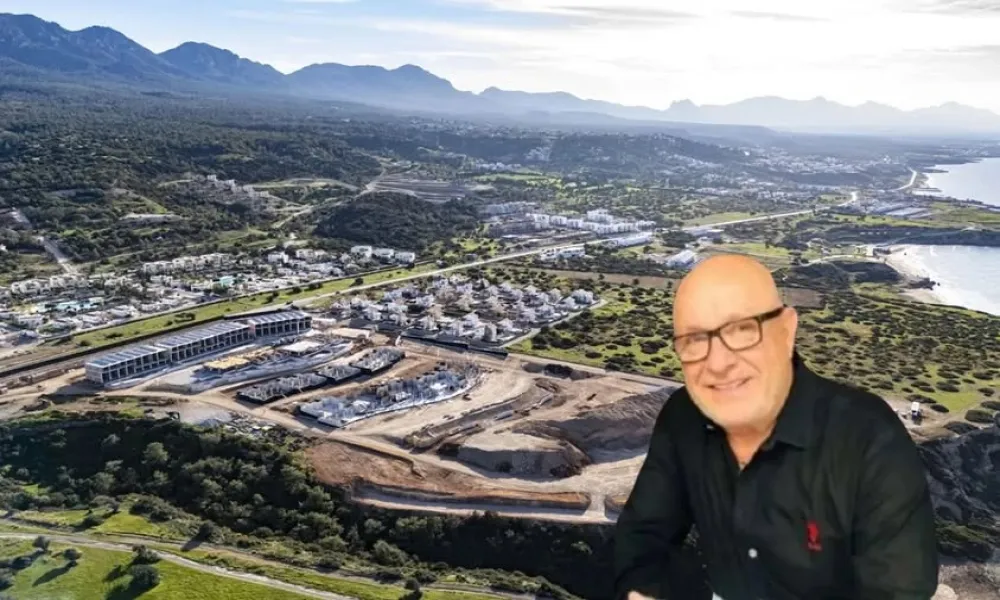The Nicosia Criminal Court sentenced Simon Mistriel Aykut, a Turkish Israeli, to five years in prison after he pleaded guilty to 40 charges relating to the illegal use and exploitation of Greek Cypriot properties in the north.
In a packed courtroom, attended by relatives and friends, Aykut listened calmly to the translated verdict delivered by the three-member panel. The court’s decision, as reflected in its reasoning, underscores the deterrent character such sentences must carry against individuals who unlawfully profit from property belonging to others.
Criminal enterprise
According to the judgment, Aykut “laid the foundations for the construction of a criminal enterprise involving fraudulent transactions targeting the immovable property of registered Greek Cypriot owners, without their consent.”
By agreeing to establish a company in the north, presenting himself as its director and shareholder, Aykut facilitated another individual in developing tourist complexes on land owned by displaced Greek Cypriots. Through this company, which was part of the Afik Group, housing units were promoted and sold.
While the court accepted that Aykut was acting on instructions from another person, it concluded that his involvement was nonetheless “substantial”, noting that “although not the mastermind, his role was a vital link in the criminal activity, without which the offences might not have been possible.”
No justification for offences of this gravity
The court further observed that Aykut knew the construction projects - six tourist developments - were being carried out on Greek Cypriot-owned land, yet “accepted the decisions taken by others and carried out their instructions,” thereby contributing directly to the offence.
Responding to the defence’s claim that Aykut’s actions were motivated by love for his son, the court stated:
“It is to the defendant’s credit that he recognised his mistake through his guilty plea. However, we cannot accept or endorse the notion that affection for one’s family may serve as justification for criminal conduct, particularly for offences of this gravity.”
The court noted that the offences spanned a period of ten years and five months, involving 40 plots of land with a combined value of nearly €39 million and a total area of 395,000 square metres. The scale and duration of the offences, it said, aggravated the seriousness of the case.
Jail term inevitable
While acknowledging Aykut’s age and the mitigating factors presented, the court concluded that the seriousness of the offences and the need for deterrence left it no option but to impose a prison sentence:
“Every other penalty would be unduly lenient. The gravity of the crimes and the observed increase in such offences demand a strong message. The prison term will reflect both mitigating and aggravating circumstances.”
Aykut received concurrent sentences amounting to five years imprisonment, reflecting the court’s view that the offences formed “part of a single and continuous course of conduct.”
The court ordered that the period Aykut spent in pre-trial detention since 19 June 2024 will count towards his sentence. He had been remanded in custody since his arrest on 7 June 2024, when he was detained at the Deryneia crossing point, a day after a warrant had been issued against him.
Decade of property sales
Holding Israeli, Portuguese and Turkish citizenship, Aykut had been active in land development and property sales in the north between 2014 and 2024.
Through a de facto company registered under the authorities of the unrecognised regime, he participated in the construction and sale of properties built on Greek Cypriot land belonging to displaced owners, without any form of consent.
The developments in question include the Ceasar Cliff, Ceasar Resort, Ceasar Beach, Ceasar Bay, Ceasar Breeze, and Ceasar Blue complexes, located in the occupied villages of Ayios Amvrosios (Kyrenia) and Trikomo, Gastria and Akanthou (Famagusta).
Ruling sends 'clear message'
Following the hearing, Senior Counsel for the Republic Andreas Aristides stated that the judgment “makes it clear that the occupation of part of Cyprus produces no legal effects to the detriment of citizens’ fundamental rights.”
He emphasised that the Republic of Cyprus, as a sovereign state, “exercises jurisdiction over acts committed anywhere within its territory, even in areas where it does not exercise effective control.”
Aristides, who represented the prosecution, said the ruling sends a clear message:
“If you buy, build or otherwise exploit property in the occupied areas belonging to Greek Cypriots, you are committing serious criminal offences.”
He also praised the police investigation team for its “meticulous professionalism and perseverance” in gathering evidence under particularly difficult circumstances due to the ongoing occupation.
